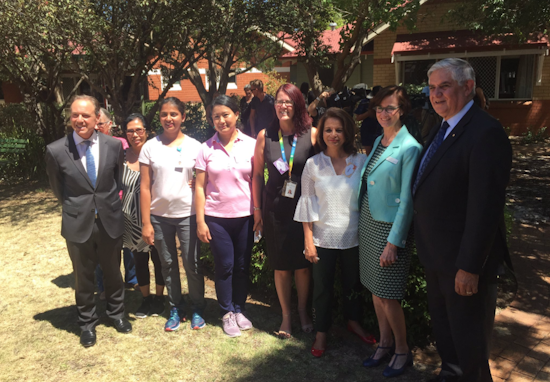Government announces $70m in dementia support
Some of the most vulnerable Australians living with dementia will benefit from a world-first national network of specialist care units, thanks to an annual $70 million Government investment.

Aged Care Minister Ken Wyatt announces the Government’s $70 million annual investment into high-level dementia support at Brightwater Care, Inglewood WA (Source: Twitter)
The program will see more than 30 specialist care units established to provide best practice, person-centred care for people with very severe behavioural and psychological symptoms of dementia, and who are currently unable to receive appropriate care in mainstream aged care services.
The program has been developed through extensive consultation with dementia experts, clinicians, state and territory governments, dementia peak bodies and carers of people living with dementia.
The Specialist Dementia Care Program will include:
-
a commitment to establish at least one specialist care unit in each Primary Health Network, generally comprising nine beds, located within existing residential aged care facilities;
-
a nationally-consistent needs-based assessment framework to ensure care is delivered to those most in need;
-
person-centred and multidisciplinary care delivered in accordance with 10 Specialist Dementia Care Program service delivery principles;
-
formalised arrangements for regular specialist clinical input and review;
-
transitional support that focuses on reducing or stabilising symptoms, with the aim of enabling the person to move to a less intensive care setting; and
-
regular reporting on client outcomes, independent evaluation and a focus on identifying and sharing best practice in specialist dementia care.
Council of the Ageing (COTA) Chief Executive Ian Yates welcomes the announcement.
“Research has shown that the “severe behaviours” attributed to dementia are often actually the result of people with dementia being in preventable pain that can be alleviated. Another key cause can be the residential care environment when it is poorly designed for people with dementia, and if staff are not appropriately trained to provide an optimum care environment,” he says.
“Over the last year, we have heard harrowing stories of people with dementia being physically and chemically restrained in aged care facilities, which is a complete degradation of basic human rights, and reflects poor training and standards of care.
“These new specialist care units are a really important supplement to basis care for people with higher level needs but should not be an excuse for good dementia care not being provided across all of aged care.”
The Specialist Dementia Care Program will be rolled out using a phased approach, starting with an early prototype service expected to be operational by mid-2019.
A tender process in early 2019 will select up to 15 units to be operational by early 2020, subject to evaluation outcomes, and the remaining sites will be selected in 2021.
Leading Age Services Australia Chief Executive Officer Sean Rooney says it is important all aged care facilities are adequately funded and staff are trained to provide high-quality dementia care regardless of whether they have a dementia specific care unit.
“The Australian Institute of Health and Welfare (AIHW) estimated in 2016 that up to 90% of residents in high care may have some form of cognitive impairment,” he says.
“Given the high proportion of aged care residents needing additional support, it is critical that dementia care is also seen as part of the core business of mainstream aged care facilities and is appropriately supported by Government.
“Innovative dementia care will draw on principles that maximise independence, reinforce personal identity, enhance self-esteem and confidence, demonstrate care for staff and welcome relatives and the local community.
“LASA wants to see Government supporting a range of models for people living with dementia, addressing the wider issues of appropriate and flexible funding to care for these people in their own environments.”
The Specialist Dementia Care Program will operate as the ‘third level’ of Australian Government programs to assist people with dementia, complementing the existing Dementia Behaviour Management Advisory Service (DBMAS) and Severe Behaviour Response Teams.
This $70 million annual investment by full rollout will be in addition to the more than $50 million the Australian Government also provides each year for a number of dementia specific programs to support quality of life and care for people living with dementia.






















